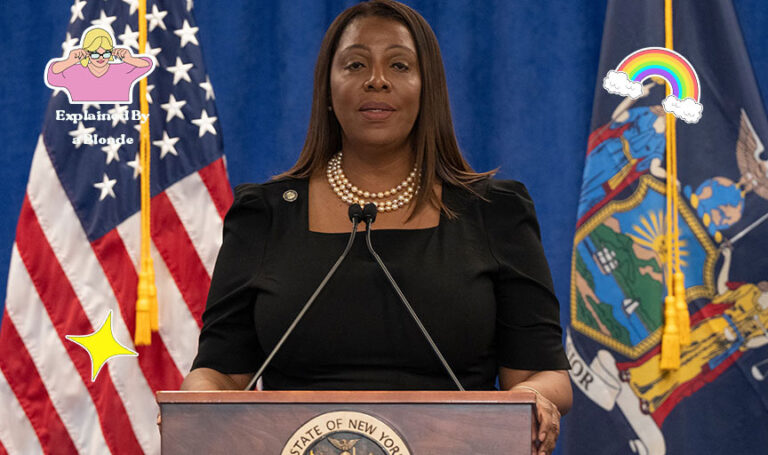New York Attorney General sues some of the US’ biggest pro-life groups for unsafe Abortion Pill Reversal treatment

Something I’ve learned recently about pro-lifers is that they are very strategic. On 6 May 2024, New York Attorney General Letitia James filed a lawsuit against the anti-abortion group Heartbeat International and 11 self-professed “pro-life pregnancy organisations,” or as they’re often referred to, crisis pregnancy centres (CPCs). This legal action came in response to a wave of misinformation regarding a scientifically unfounded treatment called ‘Abortion Pill Reversal’ (APR)—all curated in an attempt to discredit legitimate reproductive information and disrupt access to proper abortion care. The right to an abortion is one of the most politicised subjects the US has ever seen, and currently, pro-life groups are going to extreme lengths in order to ensure their side wins.
Welcome back to Explained By a Blonde. This week, we’re looking at a case study that perfectly emulates how drastically in danger reproductive rights in the US truly are. But first, let’s delve into the major players at hand.
What are crisis pregnancy centres?
So, crisis pregnancy centres (CPCs) are typically non-profit organisations established by pro-life activists. While often branded as a safe space for pregnant people to consider their options, CPCs’ true intention is to dissuade people from having abortions. Currently, there are approximately 4,000 CPCs in the US.
CPCs often prey on vulnerable individuals who are seeking care and advice regarding their pregnancy. And, as widely documented from both individual testimonies and external research, these organisations regularly use coercive tactics to mislead patients and scare them into not having an abortion.
Some of these tactics include providing false information about the different stages of pregnancy and telling people exaggerated and fear-mongering stories of abortions in order to frighten patients.
A number of CPCs have links to Christian nationalist movements and are inherently rooted in conservative social and political ideologies. Typically located in small rural towns, they’ve likely become one of Republican politicians’ most effective tools to spread anti-abortion rhetoric.
What is Heartbeat International?
Heartbeat International is an international anti-abortion association that oversees and supports the largest network of CPCs in the world. It’s undoubtedly one of the most significant pillars of anti-abortion activism in the US.
On its website, Heartbeat states that its mission is to “reach and rescue as many lives as possible, around the world, through an effective network of life-affirming pregnancy help, to renew communities for life.”
In 2020, OpenDemocracy sent a team of undercover reporters to different CPCs across the world—all of which were supported by and directly associated with Heartbeat—posing as vulnerable women with unwanted pregnancies. According to the reported findings, these women were told that getting an abortion would increase the risks of cancer and mental illness, increase women’s risks of abusing their children and that an abortion can “turn” a woman’s partner gay, among other ridiculous pieces of misinformation.
In one particularly upsetting example that took place in Spain, one reporter was given an article which claimed that after an abortion, a woman is “144 per cent more likely” to physically abuse their children.
Why is Attorney General Letitia James suing 11 crisis pregnancy centres?
One of the most recent tactics CPCs have employed is promoting a treatment called ‘Abortion Pill Reversal’ (APR). In short, APR has been advertised as a safe and effective treatment these organisations claim can “reverse” medication abortions. Newsflash: that’s a complete load of crap.
Medical abortion involves taking two pills. Activists who support APR claim that if pregnant people skip the second drug and instead take doses of progesterone, the abortion will be reversed—something that is scientifically impossible. Progesterone is a hormone that helps to maintain a pregnancy and so it’s believed that taking a high dose of this would then counteract the initial abortion pill.
The New York lawsuit states that the anti-abortion clinics “imply the impossible—that fetal tissue that has been expelled from the uterus due to a completed abortion can be returned to the uterus. It cannot,” as reported by CBS News.
According to The Guardian, a controlled clinical study looking into the reversal method and its effectiveness was abruptly stopped in 2019 after three participants ended up in hospital after haemorrhaging blood. Moreover, The American College of Obstetricians and Gynecologists (ACOG), the pre-eminent membership group for OB-GYNs, has said that claims about abortion reversal are “not based on science and do not meet clinical standards.”
The Attorney General’s lawsuit accuses these organisations of “false and misleading statements to advertise an unproven treatment.” In short, the lawsuit should clarify whether or not the promotion of APR as a safe and effective form of abortion reversal is indeed fraud.
It should be noted that California Attorney General Rob Bonta launched an almost identical lawsuit against Heartbeat back in September 2023. In its countersuit, the anti-abortion organisation argued that its claims that the treatment had been effective in 64 per cent to 68 per cent of pregnancies are based on a 2018 study by Dr George Delgado, a family physician who created the abortion pill reversal treatment.
That being said, James’ New York lawsuit notes that the study was based on tracking women who called the abortion pill reversal hotline and wasn’t a randomised, placebo-controlled trial.
It is likely that this battle will continue to forge on, especially because each day, access to reproductive care in the US becomes more and more legally and socially precarious.





